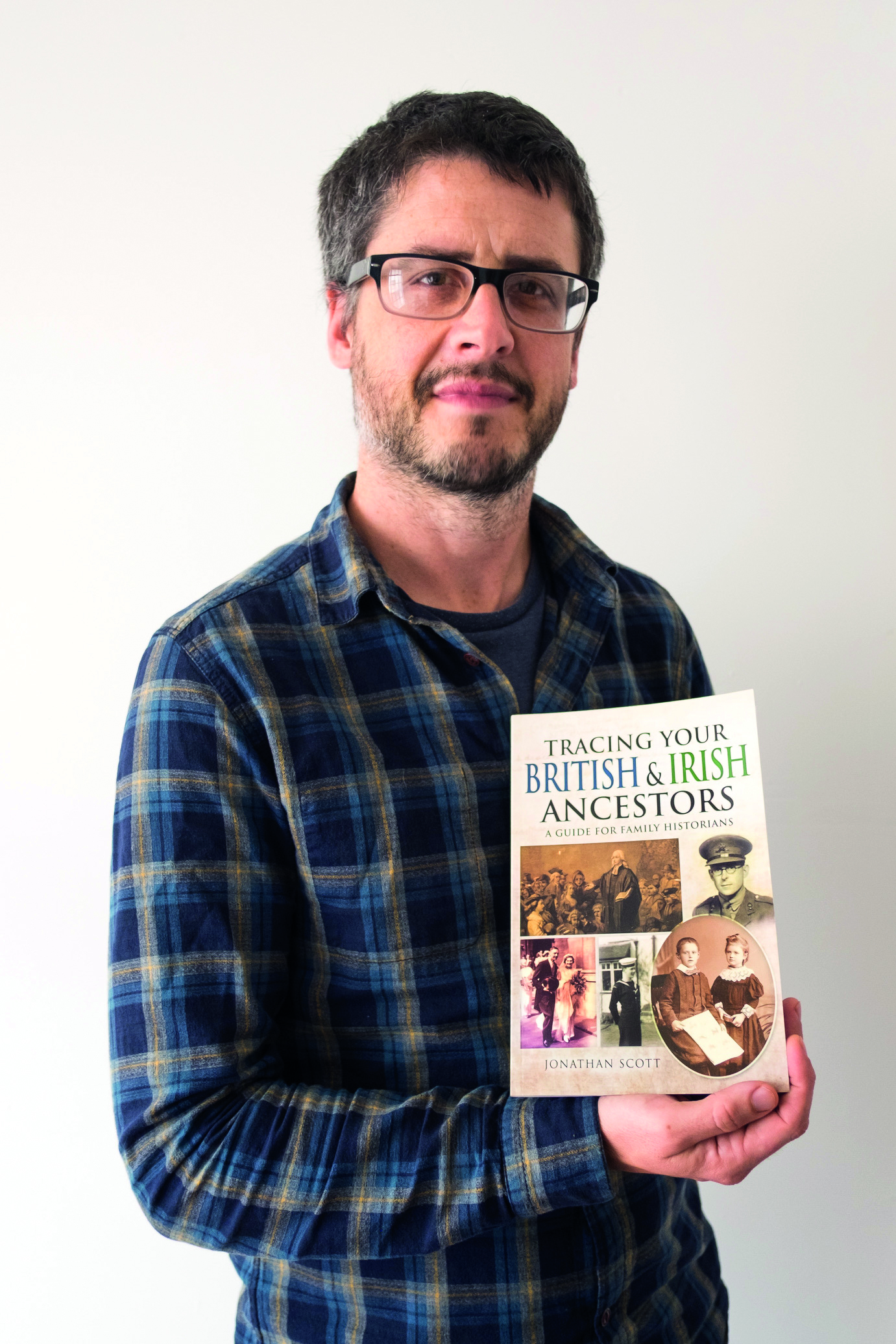The coronavirus pandemic gives us more reason than ever to be grateful for the hard work of doctors, nurses and other healthcare staff.
Many of us have medical professionals in our family tree, who helped care for patients in the different medical services that have been available in Britain throughout the centuries.
Before the NHS healthcare was fragmentary, provided through private treatment, charitable hospitals and dispensaries, and local Poor Law authorities.
Many family historians will be more interested in these pre-NHS sources, and there’s an excellent overview of the types of records that may survive for nurses, doctors and surgeons at GenGuide. The web page also lists some resources relating to the training and education of medical professionals.
Hospital staff records will in general be housed either at the local county record office (for example the London Metropolitan Archives boasts records from more than 80 hospitals), or at the hospital itself. And remember that many larger hospitals formed their own nursing schools.
These websites are a good place to start tracing your own medical ancestors.
- Ancestry
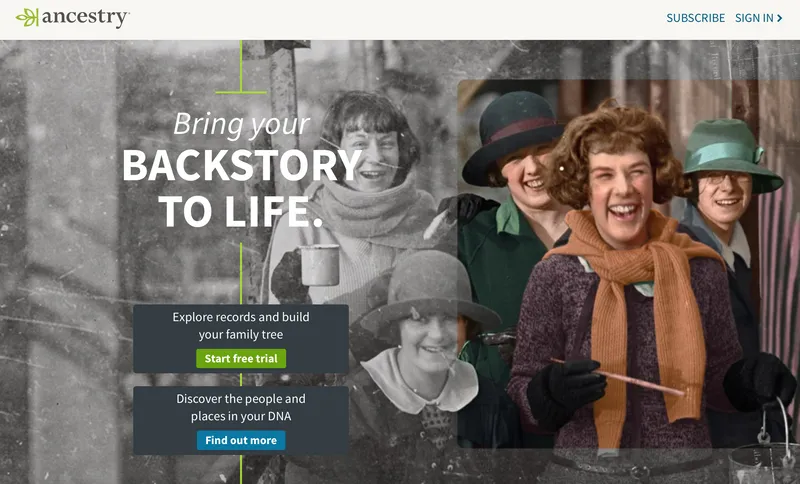
Ancestry leads the pack when it comes to commercially available medical material, through its partnerships with the Wellcome Library, the Royal College of Nursing and the General Medical Council. Collections include UK Medical Registers,1859–1959; UK and Ireland Medical Directories, 1845–1942; UK and Ireland Nursing Registers, 1898–1968; Queen’s Nursing Institute Rolls of Nurses, 1891–1931; Scotland Nursing Applications, 1921–1945; UK Midwives Rolls, 1904–1959; UK Dentist Registers, 1879–1942; GMC student registers, 1882–1937; and even Physiotherapy Registers, 1895–1980. - The Retreat
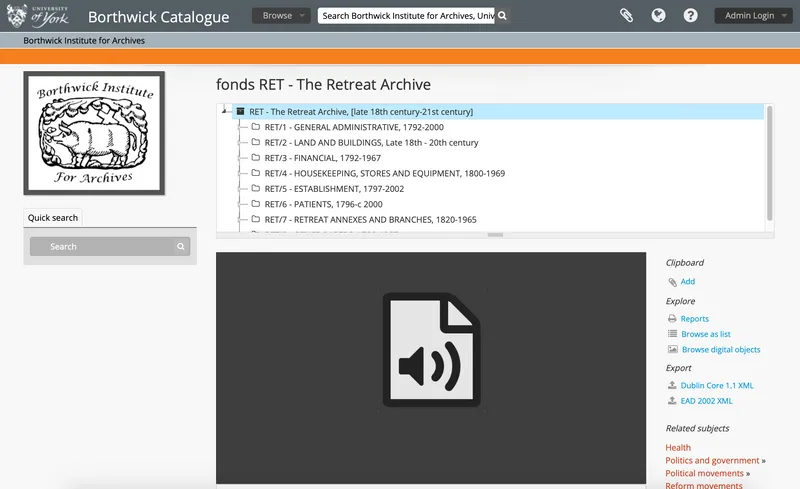
The Retreat, a psychiatric hospital that was founded in York by the Society of Friends and opened in 1796, pioneered a more humane treatment of mental health. Its unusually complete archives are held by the Borthwick Institute for Archives at the University of York, and more than 650,000 digital records images are freely available via the Borthwick catalogue. Other collections at the institute include the York NHS archive, old maps of hospitals
and hospital estates in the area (1909–1983), and the records of many older hospitals that were taken over by the NHS in 1948 - The British Medical Journal
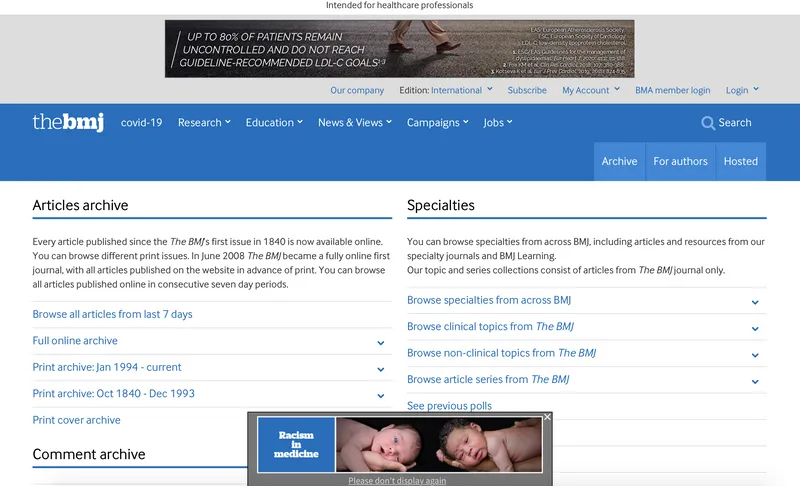
The first issue of the British Medical Journal (BMJ) appeared in October 1840, a 16-page publication which went by the original title of the Provincial Medical and Surgical Journal. Today, with the BMJ still going strong, you can explore its archive online. It’s free and a potential gold mine. You may find papers or letters written by your medical ancestors, plus the BMJ carries very useful obituaries. However, optical character recognition sometimes struggles with the early issues, so make sure you use wildcards and test variant spellings when searching.4. The Wellcome Trust The Wellcome Trust is the route to a wealth of resources, projects, databases and advice for anyone researching the history of medicine, as well as those hunting for ancestors who were doctors, nurses, midwives, physicians, surgeons, apothecaries or dentists. This is where you’ll also find the Wellcome Library.
The Wellcome Trust is the route to a wealth of resources, projects, databases and advice for anyone researching the history of medicine, as well as those hunting for ancestors who were doctors, nurses, midwives, physicians, surgeons, apothecaries or dentists. This is where you’ll also find the Wellcome Library.
However, there is so much material here that it can be confusing. So start with their family history guide, which links to genealogical guides relating to different branches of medicine.
5. British Army Nurses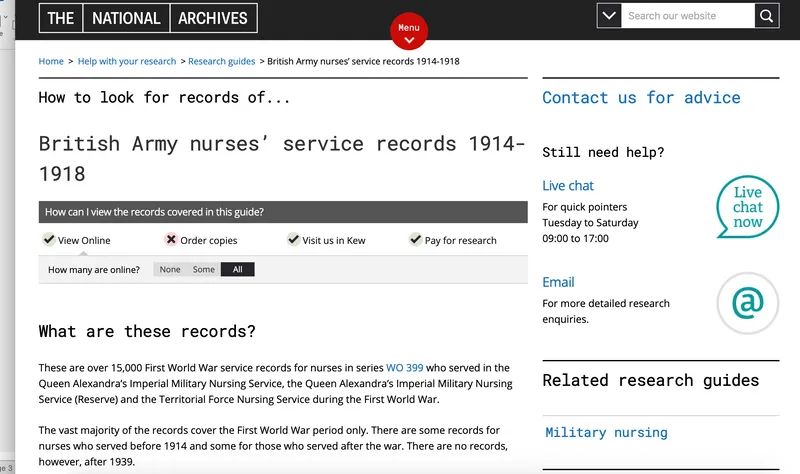
The National Archives has created several guides to researching healthcare, hospitals, doctors and nurses, military medics and wartime volunteers. This page contains more than 15,000 service records of First World War nurses, including those from the Queen Alexandra’s Imperial Military Nursing Service and the Territorial Force Nursing Service, which you can search and download. These can reveal where a nurse trained, plus references, hospitals, field ambulances or other medical units in which they served, and even their superiors’ opinion of their work.
6. Expert's choice: Royal College of Nursing
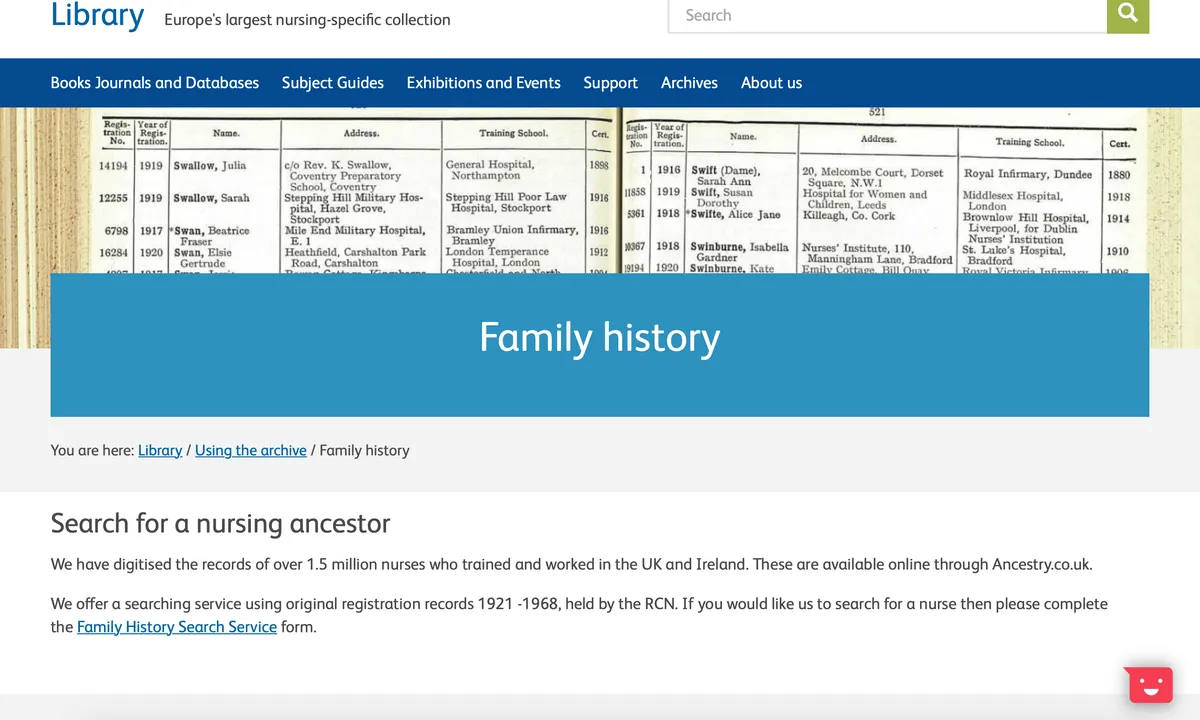
Chosen by Michelle Higgs, author of Tracing Your Medical Ancestors and Life in the Victorian Hospital:
“If you’re researching an ancestor who worked as a nurse, the Royal College of Nursing (RCN) website is well worth checking.
"You’ll find some extremely useful and detailed guides about tracing various types of nurses at different periods, for example pre-registration before 1922 and during wartime, which can all be downloaded in PDF format.
“Another excellent area of the website is the Special Collections section . Here you can read digitised historical nursing journals, which are rich sources of information about the evolution of the profession. The most valuable sections for family historians might be those that list appointments, retirements, marriages and deaths. You can also find out more about working conditions at the time your ancestor was nursing, issues of the day, and nurses’ pay and pensions.
“The RCN Archives has digitised the whole of the Nursing Record/British Journal of Nursing covering the period 1888–1956 (Nursing Record was first published in 1888, becoming the British Journal of Nursing from 1902). Family historians can search the database by name or by keyword, and each issue can also be browsed page by page.”
More great websites
Although Ancestry is the strongest subscription site for researching medical ancestors, the other major sites hold useful material. Findmypast has records of Bethlem Hospital, plus the 1913 Medical Register and TheGenealogist also offer a range of medical registers. The People’s History of the NHS includes a ‘virtual NHS museum’ and a members’ area where you can share your own memories. The NHS at 70 is a University of Manchester oral history project recording the history of the NHS from its foundation to coronavirus.
Pre-NHS healthcare was often carried out by voluntary hospitals, which are listed on the dated but still functioning Voluntary Hospitals Database. Similarly, The National Archives’ old Hospital Records Database can still be searched although it is no longer updated.
Via the website of The Museum of Military Medicine in Aldershot, you can find out more about archives and manuscript items from the four corps of the Army Medical Services. The aforementioned Wellcome Library has digitised Royal Army Medical Corps material. You can also search records of First World War volunteers at the British Red Cross website.
The UK Medical Heritage Library is a digital library of medical texts (mostly 19th century) uploaded by various institutions.
London Museums of Health & Medicine is a centralised website for various museums in London, and the individual pages for each institution often feature a ‘Family History’ section. For example, at Bethlem Museum of the Mind the archives include salary books and character books, which provide details of staff.
The Royal College of Physicians’ Munk’s Roll of Honour, a series of obituaries first compiled by librarian William Munk and published in 1861 under the title Lives of the Fellows, is available on its website.
Other useful websites include the British Dental Museum; British Military Nurses; the Historic Hospital Admission Records Project (for 19th century children's hospital records); Lambeth Palace Library, which holds medical licences issued by the Archbishops of Canterbury between 1535 and 1775; the Lothian Health Services Archive ; the Oxfordshire Health Archives; the Royal British Nurses’ Association archives at King's College London; the Royal College of General Practitioners; the library of the Royal College of Surgeons of Edinburgh; and the Royal London Hospital Museum & Archives.
Jonathan Scott is a freelance writer and family history expert. You can visit his website or follow him on Twitter.
